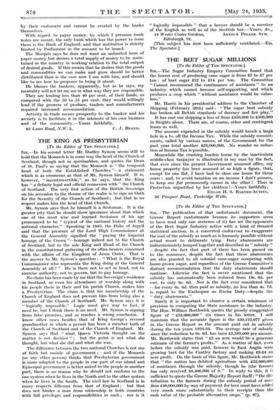THE KING AS PRESBYTERIAN
[To the Editor of THE SPECTATOR.] SIR,—In his second letter Mr. Dudley Symon seems still -to hold that the Monarch is in some way the head of the Church of Scotland, though not in spiritualibus, -and quotes the Dean
of St. Paul's as saying that the Monarch is " the temporal head of both the Established Churches "—a statement which is as erroneous as that of Mr. Symon himself. It is, however, " incontrovertible," as he says, that the King has " a definite legal and official connexion with " the Church of Scotland. The very first action of the British Sovereign on his accession to the throne of the realm is to sign an Oath for the Security of the Church of Scotland ; but that in no respect makes him the head of that Church.
- Mr. Symon says that he himself is a Scotsman. It is the greater pity that he should show ignorance about that which one of the most wise and learned Scotsmen of his age pronounced to be " typical of the national history and the national character." Speaking in 1885, the Duke of Argyll said that the presence of the Lord High Commissioner at the General Assembly signified the " paying the imperial homage of the Crown "—homage indeed not to the Church of Scotland, but to the sole King and Head of the Church
in the constitutional gathering of its office-bearers concerned with the affairs of the Kingdom of Jesus Christ. That is
the answer to Mr. Symon's question : " What is the Royal. Commissioner who represents the King doing at the General Assembly at all ? " He is there not to act as head, not to exercise authority, not to govern, but to pay homage.
No claim has been made by me that the Sovereign's residence in Scotland, or even his attendance at worship along with his people there in their and his parish Church, makes him a Presbyterian. The claim is that his membership of the Church of England does not prevent him from being also a member 'of the Church of Scotland. Mr. Symon says it is " logically impossible." Logic must give way to fact, if need be, but I think there is no need. Mr. Symon is arguing from false premises, and so reaches a wrong conclusion. I know other cases besides that of King George's revered grandmother in which a person has been a member both of the Church of Scotland and of the Church of England. Mr.
Symon says that " what Queen Victoria thought on the matter is not decisive " ; but the point is not what she thought, but what she did and what she was.
The difference between the two national Churches is not one of faith but mainly of government ; and if the Monarch
(or any other person) thinks that Presbyterian government is more adapted to the people in one part of our island and Episcopal government is better suited to the people in another part, there is no reason why he should not conform to the one system when he lives in the North and to the other system when he lives in the South. The civil law in Scotland is in many respects different from that of England ; but that does not hinder a man from citizenship in both countries with full privileges and responsibilities in each ; nor is it " logically impossible " that a lawyer should be a member of the English as well as of the Scottish bar.—Yours, &c.,
[This subject has 'lbw been sufficiently ventilated.—ED. The Spectator.]














































 Previous page
Previous page